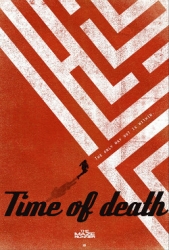A Death in Vienna

A Death in Vienna читать книгу онлайн
The sins of the past reverberate into the present, in an extraordinary novel by the new master of international suspense.
It was an ordinary-looking photograph. Just the portrait of a man. But the very sight of it chilled Allon to the bone.
Art restorer and sometime spy Gabriel Allon is sent to Vienna to authenticate a painting, but the real object of his search becomes something else entirely: to find out the truth about the photograph that has turned his world upside down. It is the face of the unnamed man who brutalized his mother in the last days of World War II, during the Death March from Auschwitz. But is it really the same one? If so, who is he? How did he escape punishment? Where is he now?
Fueled by an intensity he has not felt in years, Allon cautiously begins to investigate; but with each layer that is stripped away, the greater the evil that is revealed, a web stretching across sixty years and thousands of lives. Soon, the quest for one monster becomes the quest for many. And the monsters are stirring…
Rich with sharply etched characters and prose, and a plot of astonishing intricacy, this is an uncommonly intelligent thriller by one of our very best writers.
Внимание! Книга может содержать контент только для совершеннолетних. Для несовершеннолетних чтение данного контента СТРОГО ЗАПРЕЩЕНО! Если в книге присутствует наличие пропаганды ЛГБТ и другого, запрещенного контента - просьба написать на почту [email protected] для удаления материала
The Argentine’s demeanor turned suddenly serious.
“You should watch your back, too, Monsieur Duran. Bariloche is not a place to make careless inquiries. They don’t like outsiders asking questions about certain residents. You should also know that you’ve come to Argentina at a tense time.”
Ramirez rummaged through the pile of paper on his desk until he found what he was looking for, a two-month-old copy of the international edition of Newsweek magazine. He handed it to Gabriel and said, “My story is on page thirty-six.” Then he went into the kitchen to fetch two more beers.
THE FIRST TO die was a man named Enrique Calderon. He was found in the bedroom of his townhouse in the Palermo Chico section of Buenos Aires. Four shots to the head, very professional. Gabriel, who could not hear of a murder without picturing the act, turned his gaze from Ramirez. “And the second?” he asked.
“Gustavo Estrada. Killed two weeks later on a business trip to Mexico City. His body was found in his hotel room after he failed to show up for a breakfast meeting. Again, four shots to the head.” Ramirez paused. “Good story, no? Two prominent businessmen, killed in a strikingly similar fashion within two weeks of each other. The kind of shit Argentines love. For a while, it took everyone’s mind off the fact that their life’s savings were gone and their money was worthless.”
“Are the murders connected?”
“We may never know for certain, but I believe they are. Enrique Calderon and Gustavo Estrada didn’t know each other well, but their fathers did. Alejandro Calderon was a close aide to Juan Perón, and Martín Estrada was the chief of the Argentine national police in the years after the war.”
“So why were the sons killed?”
“To be perfectly honest, I haven’t a clue. In fact, I don’t have a single theory that seems to make any sense. What I do know is this: Accusations are flying among the old German community. Nerves are frayed.” Ramirez took a long pull at his beer. “I repeat, watch your step in Bariloche, Monsieur Duran.”
They talked awhile longer as the darkness slowly gathered around them and the wet rush of the traffic filtered in from the street. Gabriel did not like many of the people he met in his work, but Alfonso Ramirez was an exception. He was only sorry he’d been forced to deceive him.
They talked of Bariloche, of Argentina, and the past. When Ramirez asked about the crimes of Erich Radek, Gabriel told him everything he knew. This produced a long, contemplative silence in the Argentine, as if he were pained by the fact that men such as Radek might have found sanctuary in a land he so loved.
They made arrangements to speak after Gabriel’s return from Bariloche, then parted in the darkened corridor. Outside, the barrio San Telmo was beginning to come alive in the cool of the evening. Gabriel walked for a time along the crowded pavements, until a girl on a red motorbike pulled alongside him and patted the back of her saddle.
25 BUENOS AIRES • ROME • VIENNA
THE CONSOLE OF sophisticated electronic equipment was of German manufacture. The microphones and transmitters concealed in the apartment of the target were of the highest quality-designed and built by West German intelligence at the height of the Cold War to monitor the activities of their adversaries in the east. The operator of the equipment was a native-born Argentine, though he could trace his ancestry to the Austrian village of Braunau am Inn. The fact that it was the same village where Adolf Hitler was born gave him a certain standing among his comrades. When the Jew paused in the entrance of the apartment house, the surveillance man snapped his photograph with a telephoto lens. A moment later, when the girl on the motorbike drew away from the curb, he captured her image as well, though it was of little value since her face was concealed beneath a black crash helmet. He spent a few moments reviewing the conversation that had taken place inside the target’s apartment; then, satisfied, he reached for the telephone. The number he dialed was in Vienna. The sound of German, spoken with a Viennese accent, was like music to his ears.
AT THE PONTIFICIO Santa Maria dell’Anima in Rome, a novice hurried along the second-floor corridor of the dormitory and paused outside the door of the room where the visitor from Vienna was staying. He hesitated before knocking, then waited for permission before entering. A wedge of light fell upon the powerful figure stretched out on the narrow cot. His eyes shone in the darkness like black pools of oil.
“You have a telephone call.” The boy spoke with his eyes averted. Everyone in the seminary had heard about the incident at the front gate the previous evening. “You can take it in the rector’s office.”
The man sat up and swung his feet to the floor in one fluid movement. The thick muscles in his shoulders and back rippled beneath his fair skin. He touched the bandage on his shoulder briefly, then pulled on a rollneck sweater.
The seminarian led the visitor down a stone staircase, then across a small courtyard. The rector’s office was empty. A single light burned on the desk. The receiver of the phone lay atop the blotter. The visitor picked it up. The boy slipped quietly from the room.
“We’ve located him.”
“Where?”
The man from Vienna told him. “He’s leaving for Bariloche in the morning. You’ll be waiting for him when he arrives.”
The Clockmaker glanced at his wristwatch and calculated the time difference. “How is that possible? There isn’t a flight from Rome until the afternoon.”
“Actually, there’s a plane leaving in a few minutes.”
“What are you talking about?”
“How quickly can you get to Fiumicino?”
THE DEMONSTRATORS WERE waiting outside the Hotel Imperial when the three-car motorcade arrived for a rally of the party faithful. Peter Metzler, seated in the back of a Mercedes limousine, looked out the window. He’d been warned, but he’d expected the usual sad-looking lot, not a brigade-strength band of marauders armed with placards and bullhorns. It was inevitable: the nearness of the election; the aura of invulnerability building around the candidate. The Austrian left was in full panic, as were their supporters in New York and Jerusalem.
Dieter Graff, seated opposite Metzler on the jump seat, looked apprehensive. And why not? Twenty years he’d toiled to transform the Austrian National Front from a moribund alliance of former SS officers and neo-fascist dreamers into a cohesive and modern conservative political force. Almost single-handedly he’d reshaped the party’s ideology and airbrushed its public image. His carefully crafted message had steadily attracted Austrian voters disenfranchised by the cozy power-sharing relationship between the People’s Party and the Social Democrats. Now, with Metzler as his candidate, he stood on the doorstep of the ultimate prize in Austrian politics: the chancellery. The last thing Graff wanted now, three weeks before the election, was a messy confrontation with a bunch of left-wing idiots and Jews.
“I know what you’re thinking, Dieter,” said Metzler. “You’re thinking we should play it safe-avoid this rabble by using the back entrance.”
“The thought did cross my mind. Our lead is three points and holding steady. I’d rather not squander two of those points with a nasty scene at the Imperial that can easily be avoided.”
“By going in the back door?”
Graff nodded. Metzler pointed to the television cameramen and still photographers.
“And do you know what the headline will be tomorrow in Die Presse? Metzler beaten back by Vienna protesters! They’ll say I’m a coward, Dieter, and I’m not a coward.”
“No one’s ever accused you of cowardice, Peter. It’s just a question of timing.”
“We’ve used the back door too long.” Metzler cinched up his tie and smoothed his shirt collar. “Besides,chancellors don’t use the back door. We go in the front, with our head up and our chin ready for battle, or we don’t go in at all.”























